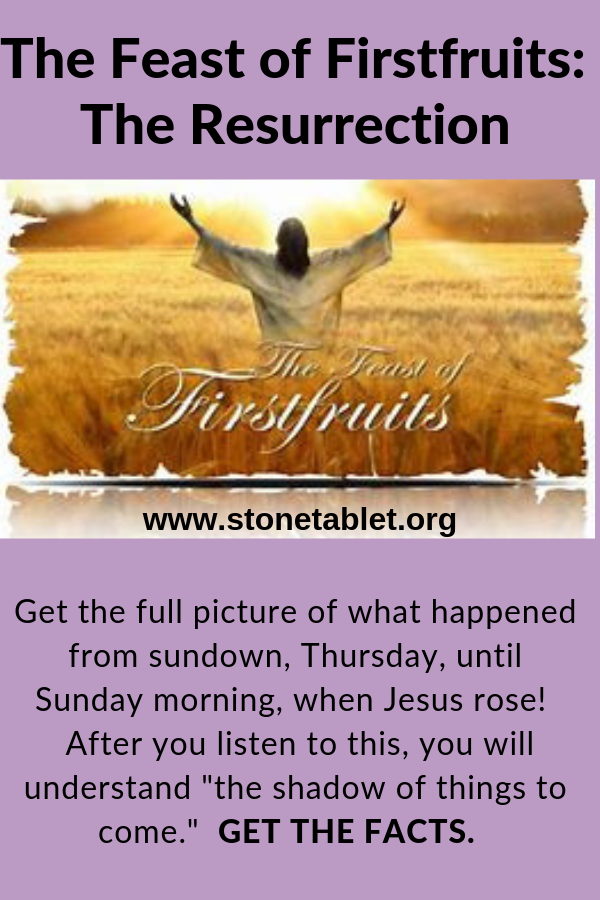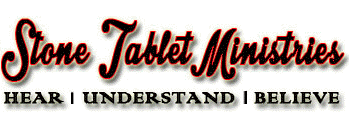The Feasts of First Fruits: The Resurrection

Review: Passover began on Thursday at sundown (Jesus implements communion with His disciples). Jesus was betrayed that night and crucified that same day at 9:00 am (Still the Passover day). Then died at 3:00 pm and was buried before the sunset of that first day (Friday). He was dead 3 days; Friday until sundown, Saturday – from sundown until sundown the next day, then He arose early Sunday morning.
What was going on during that time frame?
Leviticus 23:5 In the first month, on the fourteenth day of the month at twilight is the LORD’S Passover. (NAS)
This was in remembrance of the death-angel “passing over” everyone’s house who had slain a lamb and put the blood over the doorpost and lintel. (Exodus 12:1-28)
The Seder meal: The following benediction was pronounced before eating the lamb: “Blessed be Thou, the Eternal, our God, the King of the world, who hast sanctified us by Thy commands, and hast ordained that we should eat the Passover.” The “Hallel” was recited (Psalms 113-118) during the meal, and when the lamb had been eaten the meaning of the custom was explained, and the story of the Exodus was told.
The morning following the Passover meal (Seder), Jesus was crucified at the time of the morning sacrifice (9:00 am) and died at the time of the evening sacrifice (3:00 pm).
Numbers 28:1-4 And the LORD spoke unto Moses, saying, 2 Command the children of Israel, and say unto them, My offering, and my bread for my sacrifices made by fire, for a sweet aroma unto me, shall you observe to offer unto me in their due season. 3 And you shall say unto them, This is the offering made by fire which you shall offer unto the LORD; two lambs of the first year without spot day by day, for a continual burnt offering. 4 The one lamb shall you offer in the morning, and the other lamb shall you offer at evening; (NKJ) Tamid = always, continual employment daily, evermore, perpetual.
Mark 15:25 And it was the third hour (9a.m. – the time of the morning sacrifice*), when they crucified him. *Emphases added
Mark15:33-37 And when the sixth hour had come (*12:00), there was darkness over the whole land until the ninth hour (3 p.m.- the time of the evening sacrifice*). And at the ninth hour, Jesus cried with a loud voice, “Eloi, Eloi, lama sabacthani?” which means, “My God, my God, why hast thou forsaken me?”… And Jesus uttered a loud cry, and breathed his last. (NKJ) *Emphases added
Jesus is the true Tamid, the true perpetual sacrifice, who replaces the atoning power of the Temple sacrifice.
Mark15:37-38 And Jesus uttered a loud cry and breathed his last. And the veil of the Temple was torn in two, from top to bottom. (NKJ)
The daily Tamid was not just about sacrifice; it was also accompanied by prayers, which Jews everywhere would say while the sacrifices were being offered in the Temple. Here are a few of the prayers given while the evening sacrifice was being made:
“Look upon our affliction and plead our cause, and redeem us speedily for your name’s sake, for you are a mighty redeemer. Blessed are you, O Lord, the redeemer of Israel.”
“Forgive us, O our Father, for we have sinned; pardon us, O our King, for we have transgressed; for you pardon and forgive. Blessed are you, O Lord, who is merciful and always ready to forgive.” (Taken from traditional Jewish prayers)
Leviticus 23:6 Then on the fifteenth day (*Saturday or the Sabbath) of the same month there is the Feast of Unleavened Bread to the LORD; for seven days you shall eat unleavened bread. (NAS) *Emphases added
The children of Israel couldn’t eat leavened bread because they were going to travel and had no time to allow bread to rise. Leaven is also symbolic of sin. (Galatians 5:5-9)
Leviticus 23:9-11 And the LORD said to Moses, 10 “Speak to the Israelites and say, ‘When you enter the land I am giving you and reap its harvest, you are to bring to the priest the sheaf of the firstfruits of your harvest. 11 And he shall wave the sheaf before the LORD so that it may be accepted of your behalf; the priest is to wave it on the day after the Sabbath (*Sunday). (Berean) *Emphases added
Leviticus 23:12-14 On the day you wave the sheaf, you shall offer a year-old lamb without blemish as a burnt offering to the LORD, 13 along with its grain offering of two-tenths an ephahof fine flour mixed with oil—an offering made by fire to the LORD, a pleasing aroma—and its drink offering of a quarter hinof wine. Ephah = 4.7 quarts or 7 pounds; Hin = about 1 quart
14 You must not eat any bread or roasted or new grain until the very day you have brought this offering to your God. This is to be a permanent statute for the generations to come, wherever you live. (NKJ)
This Feast of First Fruits was filled with offerings and is to be a permanent edict or act. It was so important to God that He Himself took place in the offering of Firstfruits.
John 3:16 For God so loved the world that He gave (*planted) His one and only Son, that everyone who believes in Him shall not perish but have eternal life. (NKJ) *Emphases mine
John 12:24 Jesus said, “Truly, truly, I tell you, unless a grain of wheat falls to the ground and dies, it remains only a seed; but if it dies, it bears much fruit.” (Berean)
Jesus arose from the dead on the Festival of First Fruits in order to reap a harvest. God sowed His Son so He could reap more sons.
Romans 8:29 For unto those whom He knew beforehand, He also marked out beforehand the way that they might be conformed to the image of His Son, that He might be the firstborn among many brethren. (v28 GWT;v29 Jubilee Bible) image = “mirror-like representation,” exactly reflects its source (what it directly corresponds to); assumes a prototype, of which it not merely resembles, but from which it is drawn, then is more than a “shadow”; rather it is a replication. (Colossians 1:27) Christ in you, the hope of glory.
